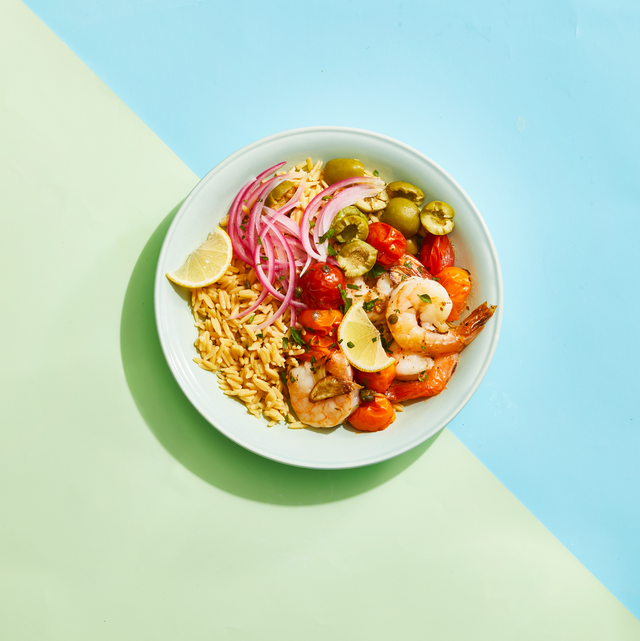
We're sharing a complete guide and food list to kick-start your healthy eating goals.
By Stefani Sassos, M.S., R.D.N., C.D.N., NASM-CPT and Trish Clasen Marsanico Updated: Jun 28, 2024 Reviewed by Valerie Agyeman, R.D. Save Article
Sitting at a taverna with a delicious Greek salad and a delectable grilled fish while taking in the Aegean Sea sounds dreamy — but if you can't spring for airfare to Santorini right now, you can still enjoy the health benefits of the Mediterranean-style diet, which is as good for your heart and brain as it is for your taste buds.
Years of research show that consuming a Mediterranean-style diet filled with fresh fruits, vegetables, nuts, whole grains, seafood and heart-healthy fats can help reduce the risk of strokes and total cardiovascular disease, including heart disease. It may also help in the prevention of type 2 diabetes. In fact, year after year, it is named the top diet by leading weight-loss analysts at U.S. News & World Report and our own Good Housekeeping Institute Nutrition Lab dietitians.
It really isn't a diet — it's more of a way of life that is inspired by the dining habits and lifestyle of the people who live in countries surrounding the Mediterranean Sea, including Greece, Italy and Spain. While there are guidelines, there are no real rules or restrictions (read: no calorie-counting!); instead Mediterranean diet recipes put an emphasis on enjoying healthy fats and plant-forward dishes with some dairy and minimal amounts of red meat, processed foods and added sugar.
This balanced and sustainable way of eating does not require you to meticulously track carbs or eliminate any of your favorite foods or beverages (moderate amounts of red wine included!). In addition to encouraging healthy eating, the Mediterranean diet also emphasizes incorporating daily physical activity into your routine.
One of the key benefits of the Mediterranean diet is that it is anti-inflammatory and can help maintain healthy cholesterol and blood pressure levels, as well as support good gut bacteria. In 2013, a team of researchers at the University of Barcelona who studied more than 7,000 participants documented drastic improvements in their heart health. A more recent study also found that elderly people may vastly improve brain function and their own longevity by adopting the Mediterranean diet.
Some of the science-backed health benefits of the Mediterranean lifestyle include:
There are no magic ingredients or trendy superfood ideas here: As is the case with almost every legitimate healthy diet, this one emphasizes whole grains, fresh produce, lean protein and heart-healthy unsaturated fats. Add to that plenty of fatty fish (especially salmon recipes) and generous servings of legumes, nuts and seeds, and you have an easy-to-follow way to plan three filling meals a day. To help you get started, here is a list of foods to consider eating on the Mediterranean diet:
Nothing is strictly off-limits on this plan, but there are certain foods that are higher in saturated fat, simple carbs, and sugar that you'll want to put on the “once in a while” list rather than every day. These include:
• Red meat
• Processed meat (sausage, cold cuts, bacon)
• Processed foods (shelf-stable cookies, chips, boxed mac-and-cheese, any kind of "nugget")
• Sugary beverages and candy
• Refined grains (white rice, white bread, pasta, crackers)
• Butter (use olive oil instead)
• Alcohol other than red or white wine
If you like to nosh during the day, no worries: There are plenty of tasty snacks on this plan that include plenty of fiber and healthy fats to satisfy your mid-afternoon munchies:
• Hummus with baby carrots or cucumbers
• Salsa with jicama sticks
• Crispy chickpeas
• A handful of raspberries or blueberries
• A quarter cup pistachios
• Frozen grapes
• Avocado on whole-grain crackers
It's easy to stay focused on this eating plan even when you go out with friends for dinner or hit the diner for brunch. Some smart ordering strategies:
• Order the seafood: Most every type of cuisine will have fish, shrimp, or scallops on the menu. Ask for it grilled, not fried.
• Pile on the veggie sides, and go for grains such as quinoa, brown rice, or farro.
• In a diner? Order a Greek salad or eggs cooked with tomatoes, peppers, spinach, and other veggies.
• Skip the bread basket, or ask for whole grain bread and dip in olive oil instead of slathering on the butter
The registered dietitians at the Good Housekeeping Institute Nutrition Lab have made it easy to follow the Mediterranean diet by putting together this sample 7-day meal plan that emphasizes real, whole foods and limits ultra-processed ones, which tend to be higher in sodium, saturated fat and added sugar.
With these simple recipes, there's no calorie-counting or restrictive portion sizes. You can fill up on tons of veggies, fruits, whole grains and beans; enjoy lean proteins such as seafood, chicken and eggs; and indulge in sweets and alcohol.
Since a typical Mediterranean diet prioritizes the enjoyment of the dining experience, flavorful ingredients are at the forefront of these heart-healthy recipes, so you’ll never feel deprived. Here's how to get started on the Mediterranean diet, with nutritionist-approved ideas for breakfast, lunch and dinner.
Editor's note: Weight loss, health and body image are complex subjects — before deciding to go on this diet, we invite you to gain a broader perspective by reading our exploration into the hazards of diet culture. While the Mediterranean diet enjoys a rare level of widespread support from dietary experts, it's always best to consult with your healthcare provider before starting any new eating plan.